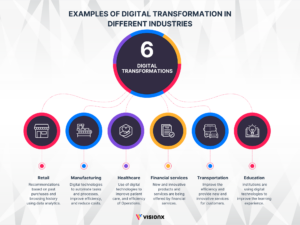In the ever-evolving digital landscape, enterprise digital transformation is reshaping how businesses operate and thrive. With technology at the forefront, organizations embark on a transformative journey transcending traditional boundaries. From streamlining processes to enhancing customer experiences, the winds of digital transformation are sweeping through industries, empowering businesses to stay ahead in an increasingly competitive world.
In this article, let’s explore the realm of digital transformation for enterprises, delving deep into its profound impact on business operations. We will uncover the key benefits it brings to organizations and the essential steps in successfully navigating this path.
What Is Enterprise Digital Transformation?
In the enterprise, digital transformation transforms organizational operations using digital technologies. It is a complex and challenging undertaking, yet a powerful way for organizations to improve their efficiency, productivity, and competitiveness.
Why Digital Transformation? Way to Staying Competitive in the Digital Age
In today’s business landscape, digital transformation is imperative for maintaining competitiveness. Adapting to the digital age allows organizations to meet evolving customer expectations, optimize operations, and unlock new revenue streams.
Embracing innovative technologies, leveraging data-driven insights, and delivering seamless digital experiences are essential to thrive amidst digital disruptors and changing market dynamics. By embracing digital transformation, businesses can stay agile, enhance efficiency, and meet the demands of the modern customer, gaining a competitive edge in the digital era.
Common Themes in Digital Transformation: Key Elements for Organizational Success
Digital transformation in an enterprise can involve a wide range of changes, including the adoption of new technologies, the reengineering of business processes, and the transformation of the organizational culture. The specific changes that are needed will vary depending on the organization’s industry, size, and goals.
However, some common themes include the following:
- The use of digital technologies to automate tasks and processes
- Analyzing data and getting insights into customer behavior & preferences customer behavior and preferences
- The use of data-driven decision-making to improve decision-making and performance
- Creating new products & services that meet the needs of customers in the digital age
- The development of a digital-first culture that embraces change and innovation
7 Benefits of Enterprise Digital Transformation
Enterprise digital transformation has several benefits. Some of the most common benefits include:
- Increased efficiency and productivity
- Improved customer service
- Increased innovation
- Enhanced decision-making
- Reduced costs
- Increased revenue
- Improved brand reputation
The Challenges of Enterprise Digital Transformation
While there are many benefits to adopting digital solutions, there are also some challenges that organizations need to be aware of. Some of the most common challenges include:
- The cost of implementing DX
- The need for change management
- The risk of failure
- The need for new skills and training
- The need to secure data
How to Implement Enterprise Digital Transformation?
There is no one-size-fits-all approach to implementing enterprise digital transformation. However, there are some general steps that organizations follow as best practices to improve their chances of success. These steps include:
- Define your goals: To begin with, define your objectives. Once you decide & know your goals, you can develop a plan to achieve them.
- Assess your current state: Assess your current state to identify the areas where you need to improve.
- Develop a plan: After your current organizational position, it’s time to develop a plan for implementing digital transformation. You should include a timeline, a budget, and a list of resources in your project.
- Implement your Planning: This will involve making changes to your business processes, your technology, and your culture.
- Measure your results: Finally, you need to measure your results. How has digital transformation impacted your efficiency, productivity, and customer service? Tracking your progress helps with necessary adjustments to your plan.
The Scope of Enterprise Digital Transformation
The scope of digital transformation is vast and can vary depending on the organization’s industry, size, and goals. However, some common areas where digital transformation can be applied include:
- Customer experience: Digital technologies often provide personalized recommendations, offering real-time support, and making it easier to purchase products and services, thus overall enhancing the customer experience.
- Operations: Digital technologies can be used to automate tasks and processes, improve efficiency, and reduce costs. For example, businesses can use robotic process automation (RPA) to automate repetitive tasks, such as data entry and customer service.
- Innovation: Digital technologies can be used to improve existing services and find new business opportunities. In order to meet customer needs, businesses can develop new products and services using artificial intelligence (AI).
- Culture: Digital transformation can also impact organizational culture. By embracing digital technologies, organizations can become more agile, innovative, and customer-centric.
The scope of digital transformation is constantly evolving as new technologies emerge. To remain competitive, organizations need to be prepared to change as new technologies emerge.
Examples of Digital Transformation in Different Industries
Now let’s take a look at real-life implementations of Digital Transformation.

Retail:
Digital technologies are helping retailers improve the customer experience in several ways, including providing real-time support and personalized recommendations and making it easier to buy products and services. Amazon, for instance, recommends products to customers based on their past purchases and browsing history using data analytics.
Manufacturing:
Manufacturers are using digital technologies to automate tasks and processes, improve efficiency, and reduce costs. For example, General Electric uses 3D printing to create custom parts for its jet engines.
Healthcare:
Healthcare organizations are using digital technologies to improve patient care, reduce costs, and improve the efficiency of operations. For example, Kaiser Permanente uses electronic health records (EHRs) to provide patients with access to their medical records online and to improve communication between doctors and patients.
Financial services:
New and innovative products and services are being offered by financial services organizations using digital technologies. For example, Charles Schwab offers online banking and investing services that allow customers to manage their finances from anywhere in the world.
Transportation:
Transportation companies are using digital technologies to improve the efficiency of their operations and to provide new and innovative services to their customers. For example, Uber uses a mobile app to connect riders with drivers, and Lyft uses a similar app to connect riders with drivers who are willing to share their rides.
Education:
Educational institutions are using digital technologies to improve the learning experience for their students. Online courses, for example, allow students to study with comfort from anywhere in the world.
Government Sector:
Government agencies are using digital technologies to improve government services to citizens. Online tax filing services are offered by the Internal Revenue Service (IRS) that allow taxpayers to file their taxes from anywhere in the world easily.
Conclusion
Digital transformation is a dynamic process that demands continuous adaptation to the ever-changing digital landscape. The organizations that thrive in this transformation are those capable of embracing change, fostering innovation, and creating new value for their customers.
However, Seeking guidance from expert companies specializing in business consultation and IT support, such as VisionX, is essential. By partnering with VisionX, you gain access to a team of professionals who provide custom solutions for your organization, like Enterprise Software Development, Enterprise Customer Support, and Maintenance Services. With VisionX’s expertise, organizations can navigate the complexities of digital transformation and unlock their full potential for growth and success.
